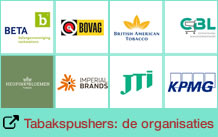Dr. Derek Yach: “Als één tabaksfabrikant stopt met de verkoop van sigaretten, springt een ander in het gat”
woensdag 25 oktober 2017
UPDATE 28-10-2017
Dr. Derek Yach wordt door zijn collega’s wereldwijd voor gek verklaard omdat hij een miljard dollar aanneemt van Philip Morris voor zijn Foundation for a Smoke-Free World. TabakNee stelde hem per mail een aantal kritische vragen. Hieronder het integrale interview (in het Engels).
Door de webredactie
How did the Foundation for a Smoke-free World came to be? Were you approached by Philip Morris or did you approach them?
“The idea came up about a year ago during a discussion I was having with PMI. I suggested that tobacco control research – especially outside of the USA and UK - is seriously underfunded. So through the Foundation, it is my intent to draw upon the best peer-reviewed science to accelerate the end to smoking.”
Why you were in contact with PMI in the first place? If you were talking to them about this problem of there being underfunded tobacco control research, does that mean that you have approached them for funding or hoping they would fund research?
“During our meeting, I suggested the creation of an independent Foundation. During that same meeting, I also said PMI should support the major provisions of the FCTC and end lobbying against measures that accelerate prevention. “
What has your thought process been around taking money from the industry for this foundation?
“Industries have historically funded research and science across many sectors even when it might appear that the results could undermine their core business. This includes energy, gas, transport and many elements of the health sector. They fund research in the hope that innovation will lead to solutions to complex social, environmental and health problems. Philips’s investments in LED lighting research way back being one example. Within tobacco control I looked to an article published in the journal Tobacco Control in February, 2009 where a group of tobacco control colleagues led by Johanna Cohen and Mitch Zeller issued a set of eight criteria for researchers to consider before accepting research funding from the tobacco industry. This was based on an extensive consultation across the field. They also laid out options for how this funding could be structured, and one of those options was the development of a third-party entity such as an independent foundation. I also looked to other, similar tobacco control initiatives that are funded by the tobacco industry, such as The Truth Initiative in the United States. Stringent protections could – and already have been – successfully enacted to assure the industry has no influence over an independent foundation.”
How will you make sure the foundation will be independent?
“The Foundation’s legal structure builds on the stringent controls already being used by other tobacco control research organizations that receive funding from the tobacco industry, such as those funded under the Tobacco Master Settlement Agreement in the United States. This includes: independent governance, the transparent development of research topics with input from the broader research community, a peer reviewed and competitive process to select research institutions, ownership of data, freedom to publish, and the placement of raw data in the public domain so it can be analyzed by others. Additionally, PMI may not cite the existence of the Foundation or its work as part of its public relations or reputation programs. As detailed in this letter to the WHO, the structure and mission of the Foundation are squarely in line with the WHO FCTC and specifically Article 5.3 of the FCTC. Further, the Foundation is required under US law to assure independence of its work from its funders”
One could think that if the objective of Philip Morris truly is to make the world smoke-free, they simply need to stop their factories and take their products of the markets. Are you worried PMI is using your foundation for other purposes, for instance, polishing up their image and using the news about this foundation to market their IQOS-products?
“As mentioned earlier, a condition of the funding precludes PMI from mentioning its support for the Foundation in any public relations or reputational efforts. Furthermore, as a philanthropic foundation, the Foundation is legally prohibited from working to advance the commercial interests of its funders. I hope soon we will be able to move past media articles that only serve to further publicize PMI’s donation and instead focus on the important work the Foundation will be doing to help eliminate cigarettes and improve the health of the world’s one billion smokers. “
Don’t you think that those media articles were exactly what the industry was aiming for: A global cycle of news articles talking about how PMI wants to support a smoke free world? Is is the best advertisement they could hope for. The timing of announcing the funding of the Foundation for a Smoke-free world is interesting too since PMI wants people to buy their IQOS products, even though no research has been done about the long term effects of it’s use. If the Foundation is used for PR in the future, even though PMI is not allowed to, as you say above, what will be the consequence? That you, for example, return the funding to them?
“The early response to PMI's announcement has hardly been positive, with many of the media articles about the Foundation justly criticizing PMI and the tobacco industry for its practices of opposing measures that accelerate smoking prevention.”
But what you think about the statement that PMI could create a smoke-free world by taking their products of the market and shutting it’s factories? Have you for example told them that that is what you hope they will do? If they’re truly concerned about the health of their customers they hold the key: stop their business. If they’re unwilling to stop their factories, that means that they’re not ready to give up profiting from their customers. Therefore funding a Foundation for a Smoke-free World could be viewed as a way of distracting from their core business: profiting from smokers all over the world, instead of wanting to help those smokers getting healthy by quitting smoking altogether.
“The premise of the question is a bit naïve. If a tobacco company simply stops selling cigarettes, its competitors will cheer and fill the gap in the market. The long-term solution is to help smokers quit smoking and eliminate the market for cigarettes.”
Do you think PMI is benefitting from someone with your reputation to lead this foundation? Do you think the industry is using their donations, the foundation and your reputation to get a seat back at the table in the anti smoking debate?
“As a lifelong tobacco control advocate, I can assure you the Foundation will be taking a critical look at the tobacco industry, its policies and its products. I outline some of our plans in a recent article in The Lancet. The only way the industry will gain from our work is if the industry aligns on ending smoking as fast as possible. That would require industry to support the main provisions of the FCTC and accelerate development of science-based reduced risk products that displace cigarettes in all markets.”
Matt Meyers, the President of the Campaign for Tobacco-Free Kids was quoted in The Cancer Letter saying: “I personally do not think anybody actually interested in reducing the death and disease from tobacco should give Philip Morris International any credibility as long as they continue to market the product the way they do. As long as they continue to introduce highly flavored new forms of Marlboro to attract kids. As long as they oppose high cigarette taxes, oppose effective warning labels, oppose paid mass media campaigns. Otherwise, it’s simply a get-out-of-jail-free card.”
What is your response to that? Even though you seem to have thought through assurances, aren’t you afraid that by the simple fact that you’ve accepted money from PMI, you’ve seriously injured your credibility and also the credibility of the outcomes of the research you want to fund?
“I have long respected Matt but fear he and other critics are missing the way disruptive technologies are transforming many legacy, dirty, health damaging industries. Speeding this transformation along requires scientific research, new regulations and the public understanding of the relative risks and benefits. As to my credibility -- I leave that for others to decide but I remain committed to a simple goal -- promoting health and preventing disease and drawing upon the best means to do so. And that is the core of the Foundation’s work.”
How do you see that in light of the FCTC-treaty article 5.3?
“The Foundation aims to rapidly and effectively eliminate harm and deaths from smoking around the world. Surely that mission is squarely in line with the mission of WHO, the FCTC and Article 5.3. The Foundation is fully compliant with FCTC article 5.3, and compliance is detailed in a letter I sent to WHO on September 29. The letter is posted on the Foundation’s website at this link.”
What is your response to the statement the WHO has made about the foundation of a Smoke-free World and you?
“I am aware of WHO’s mischaracterization of the Foundation’s mission to eliminate smoking, improve health and reduce death and disease from tobacco. As noted in the last answer, I sent a letter to Dr. Vera Luiza da Costa e Silva correcting correct some of WHO’s more significant misperceptions about the Foundation and inviting her to meet to discuss the Foundation’s plans, structure and mission. The letter is posted on the Foundation’s website at this link: WHO’s mission and the Foundation’s mission are one in the same – to eliminate smoking and improve the health of the world’s one billion smokers. I am certain that in time WHO will review their early response and do so as their member states require such change.”
UPDATE 28-10-2017
Ook in de rubriek Three Questions van The Financial Times komt Derek Yach aan het woord:
Derek Yach, one of the architects of the World Health Organization’s Framework Convention on Tobacco Control, has been appointed head of the Foundation for a Smoke-Free World, with $1bn in funding over 12 years from Philip Morris International [PMI]. Mr Yach, who is from South Africa, argues he can work freely for “harm reduction” with a shift away from cigarettes; critics suggest taking money from “Big Tobacco” is counter-productive.
How do you respond to the criticism of you for taking charge of the foundation?
I’ve brought tobacco control back to life. Shouldn’t I get some credit for getting the debate going after a decade of bureaucratic inertia? I was surprised with the efforts to close down discussion in the face of a world trend which is trying to open it up. For every critique, I get requests from quality scientists, suggesting there has been a pent-up demand for innovation not just for reduced risk but in smoking cessation. When you look at the pipeline, for the last 20 years there have been very few new products.
Can the foundation be truly independent of PMI?
It’s equivalent to people asking me during apartheid in South Africa how could I be taken seriously while the government still had people in prison. The two are completely de-linked. The foundation is truly independent, and we don’t have to explain continued bad behaviour. We have to monitor it, report on it and evaluate new products as a way out. We should do the same for all tobacco companies.
Are you willing to criticise Philip Morris for its tobacco marketing and lobbying activities?
I’m willing to criticise any practice that doesn’t meet the Framework Convention on Tobacco Control, especially marketing to children. I’m also realistic. This needs to be done in an industry-wide way . . . If your main competitor is not [pulling back from marketing], it’s simply unilateral disarmament. [PMI] should be abiding by the convention. But in some areas they are lobbying in the public interest and are opposed by the public health [community], such as for a ban on ecigarettes. That is telling a smoker to continue [smoking].
tags: lobbyist van de maand | tabakslobby | onderzoek | tabaksindustrie










 Stichting Rookpreventie Jeugd is geregistreerd als Algemeen Nut Beogende Instelling (RSIN: 820635315 | KvK: 34333760).
Stichting Rookpreventie Jeugd is geregistreerd als Algemeen Nut Beogende Instelling (RSIN: 820635315 | KvK: 34333760).